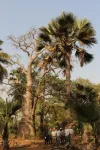Older Canadians say they're more willing to get the flu shot in the wake of COVID-19
2021-05-26
(Press-News.org) The pandemic has increased older adults' willingness to receive the flu shot, new research shows.
The study analyzed survey results of 4,501 Canadians over the age of 50 from ten provinces.
Twenty per cent of 1,001 research participants aged 50 to 64 indicated they had not considered getting a flu shot, but were now more likely to given the impact of COVID-19. Of these respondents, 92 per cent inducated that they had not been vaccinated against influenza the year before.
Of the 3,500 participants aged 65 and older, eight per cent reported that they had not originally planned to get a flu shot but were now more likely to receive it.
"The pandemic has been a sobering demonstration of the dangers of infectious diseases," said Nancy Waite, a professor at the School of Pharmacy and the lead author on the study. "We've seen changing perceptions of the value of vaccines and a documented change in people's willingness to consider getting vaccinated."
Participants who said they would get the influenza vaccine--both those who got it before and those who had not--cited various reasons that reinforced their decision. For some, COVID-19 has demonstrated the devastating potential of viruses, and this awareness sparked the realization that there are severe outcomes of influenza due to risk factors including age. Others also cited the increased risks due to COVID-19 and influenza circulating simultaneously, or a desire to reduce vulnerability to COVID by protecting against influenza.
Just over two per cent of 50- to 64-year-olds and 0.8 per cent of respondents 65 years and older indicated that although they had previously received the influenza vaccine, during the COVID-19 pandemic they were less likely to consider influenza vaccination. This smaller group of participants cited fear of being exposed to COVID-19 when receiving their influenza vaccination and decreased anticipated risk of contracting influenza due to social distancing, as reasons.
"It is helpful for health-care providers who have vaccine conversations with the public to understand the context in which individuals are making decisions. These contexts are fluid, and we need to answer the questions individuals currently have to help them make informed decisions," Waite said. "Our findings demonstrate that the pandemic has created new motivations for many older adults to be accepting of the influenza vaccine but has also created concerns for a small group that health care professionals should be prepared to address."
INFORMATION:
The study was recently published in the journal, Vaccines, and featured a cross-disciplinary research team from the University of Waterloo, Laval University in Quebec, Dalhousie University in Nova Scotia, and JRL Research and Consulting.
ELSE PRESS RELEASES FROM THIS DATE:
2021-05-26
A hidden planetary crisis has long been neglected that is as serious as the disappearance of species and degradation of habitats. Genetic diversity, which reflects the variation in DNA within species and populations and is the key to their capacity to adapt in times of change, is being lost at an alarming rate. According to an article by 28 authors representing 16 countries, the loss of genetic diversity can affect resiliency in the face of environmental change and result in the loss of important services provided to society. Once gone, genetic diversity can take millennia to return. ...
2021-05-26
A new study by Cardiff University in collaboration with the University of Hertfordshire has revealed the huge "secondary burden" placed on those closest to people living with Long Covid.
The researchers surveyed more than 700 Covid-19 survivors along with their partners and close relatives to understand for the first time the impact of the disease on families as a whole.
The findings, published today in BMJ Open, suggest family quality of life is being "severely affected" and a major system of support is needed for both survivors - and those closest to them.
Survivors and their families spoke ...
2021-05-26
Clots in the arteries (arterial thrombosis) are the most common cause of stroke (ischaemic stroke) and have been reported in detail for the first time in young adults who received the Oxford-AstraZeneca covid-19 vaccine in a letter from UK stroke specialists published online in Journal of Neurology Neurosurgery & Psychiatry.
While rare cases of blood clots have been reported previously after administration of the Oxford-AstraZeneca covid-19 vaccine, these have affected veins and most specifically veins in the brain (cerebral venous sinuses).
People who have experienced this unusual form of stroke (cerebral venous sinus thrombosis) have also had low platelet ...
2021-05-26
Up to a third of patients taking methotrexate - a common treatment for immune mediated inflammatory conditions such as rheumatoid arthritis and psoriasis/psoriatic arthritis - failed to achieve an adequate immune response to mRNA COVID-19 vaccines in a small study accepted for publication in the journal Annals of Rheumatic Diseases.
While mRNA COVID-19 vaccines have been shown to produce an effective immune response in over 90% of healthy adults in clinical trials, it is unknown whether the immune response is as robust in patients with immune-mediated inflammatory diseases (IMID) who may also be taking immunomodulatory medications.
The authors assessed the immune response to the mRNA Pfizer-BioNTech COVID-19 vaccine in 82 patients ...
2021-05-26
First-born children have a lower risk of cardiovascular events such as heart attacks and strokes than brothers and sisters born later, but people who are part of a large family with many siblings have an increased risk of these events, suggests the results of a large population study in Sweden, published in the online journal BMJ Open.
It is well-known that family history - the health of parents and grandparents - has an impact on a person's health, including their risk of cardiovascular events, but now there is growing interest in what influence the make-up of a person's immediate family - the number and age of siblings - might have.
The authors accessed data on 1.36 million men and 1.32 million women born between 1932 and 1960 and aged 30-58 years in ...
2021-05-25
While some studies suggest female patients treated by female physicians have better outcomes, there does not appear to be a relationship between operator and patient gender and outcome in patients undergoing coronary angioplasty or stenting. These are the results of a first-of-its-kind study by the Blue Cross Blue Shield of Michigan Cardiovascular Consortium (BMC2) and published in Catheterizations and Cardiovascular Interventions.
The study looked at procedures performed by 385 male interventional cardiologists, and 18 female interventional cardiologists at 48 non-federal hospitals across the state of Michigan. Female interventional cardiologists continue to be markedly under-represented and only perform a small percentage of cases, with women accounting for ...
2021-05-25
Army ants form some of the largest insect societies on the planet. They are quite famous in popular culture, most notably from a terrifying scene in Indiana Jones. But they are also ecologically important. They live in very large colonies and consume large amounts of arthropods. And because they eat so much of the other animals around them, they are nomadic and must keep moving in order to not run out of food. Due to their nomadic nature and mass consumption of food, they have a huge impact on arthropod populations throughout tropical rainforests floors.
Their mass raids are considered the pinnacle of collective foraging behavior in the animal kingdom. The raids are a coordinated ...
2021-05-25
CHAMPAIGN, Ill. -- Advanced microscope technology and cutting-edge geological science are giving new perspectives to an old medical mystery: How do kidney stones form, why are some people more susceptible to them and can they be prevented?
In a new paper published in the journal Nature Reviews Urology, researchers from the University of Illinois Urbana-Champaign, Mayo Clinic and other collaborators described the geological nature of kidney stones, outlined the arc of their formation, established a new classification scheme and suggested possible clinical interventions.
"The process of kidney stone formation is part of the natural process of the stone formation seen throughout nature," Illinois geology professor ...
2021-05-25
Reno, Nev. (May 25, 2021) - After a wildfire, soils in burned areas often become water repellent, leading to increased erosion and flooding after rainfall events - a phenomenon that many scientists have attributed to smoke and heat-induced changes in soil chemistry. But this post-fire water repellency may also be caused by wildfire smoke in the absence of heat, according to a new paper from the Desert Research Institute (DRI) in Nevada.
In this pilot study (exploratory research that takes place before a larger-scale study), an interdisciplinary team of scientists led by DRI Associate Research Professor of Atmospheric Science Vera Samburova, Ph.D., exposed samples of clean sand to smoke from burning Jeffrey pine needles and branches ...
2021-05-25
Cells are the building blocks of life, present in every living organism. But how similar do you think your cells are to a mouse? A fish? A worm?
Comparing cell types in different species across the tree of life can help biologists understand how cell types arose and how they have adapted to the functional needs of different life forms. This has been of increasing interest to evolutionary biologists in recent years because new technology now allows sequencing and identifying all cells throughout whole organisms. "There's essentially a wave in the scientific community to classify all types of cells in a wide variety of different organisms," explained Bo Wang, an assistant professor of bioengineering at Stanford University.
In response to this opportunity, ...
LAST 30 PRESS RELEASES:
[Press-News.org] Older Canadians say they're more willing to get the flu shot in the wake of COVID-19


